
Colon Cancer Treatment in Bangalore
According to the World Health Organization (WHO), colorectal cancer accounts for over 10% of all cancer diagnoses worldwide.
Colon cancer, a type of colorectal cancer, originates in the large intestine, which is the final part of the digestive tract. This malignancy develops when abnormal cells grow uncontrollably in the colon, forming tumors. It is primarily categorized based on whether the tumors are benign (non-cancerous) or malignant (cancerous). Colon cancer often starts as small, benign polyps that may become malignant over time. As shared by the treating oncologist, early screening and timely intervention play a critical role in preventing polyps from progressing to full-blown colon cancer.
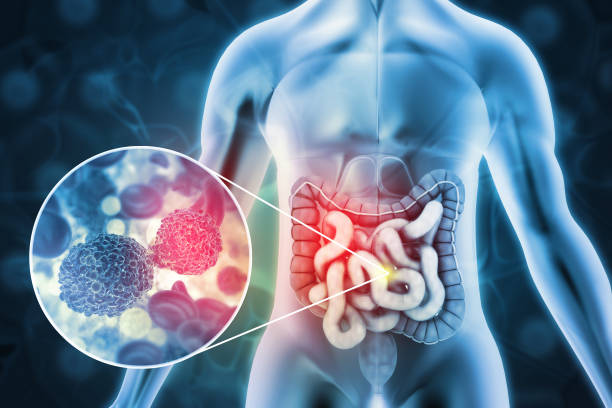
Dr. Manish Kumar, a seasoned medical oncologist in Bangalore, explains:
“The key to battling colon cancer effectively is timely intervention. Advances in medical oncology have enabled precise treatments that minimize side effects while improving recovery rates. A collaborative approach involving the patient and a multidisciplinary team makes a profound difference in long-term outcomes.”
Have you ever wondered how colon cancer manifests? Recognizing the symptoms is critical.
Symptoms of Colon Cancer
Colon cancer symptoms can vary and are often subtle in the early stages:
Persistent Changes in Bowel Habits: Includes diarrhea, constipation, or inconsistent bowel movements lasting longer than usual.
Rectal Bleeding: Bright red or dark blood in stool can signal internal bleeding.
Unexplained Weight Loss: A sudden and unintentional drop in weight may occur as the cancer progresses.
Abdominal Pain and Cramping: Discomfort that doesn’t subside could be a warning sign.
Fatigue and Weakness: Result from blood loss and the body’s energy being diverted to fight cancer.
Incomplete Bowel Emptying: A feeling that the bowel hasn’t been fully evacuated after a movement.

Stages of Colon Cancer
Colon cancer progresses through the following stages:
Stage 0: The deepest layer of the colon or rectum contains abnormal cells
Stage I: Cancer is localized in the inner lining of the colon.
Stage II: The tumor invades nearby tissues but hasn’t spread to lymph nodes.
Stage III: Cancer reaches the lymph nodes, indicating an increased risk of metastasis.
Stage IV: Cancer spreads to distant organs, such as the liver or lungs, making treatment more complex.
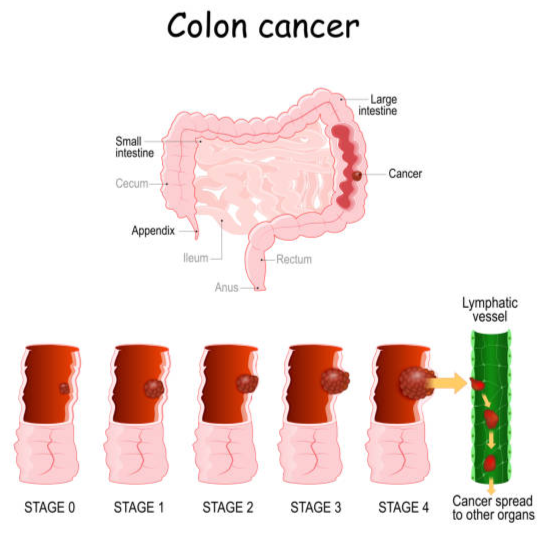
The next question is, how is colon cancer identified accurately?
Diagnosis of Colon Cancer
Medical professionals rely on advanced diagnostic tools to confirm colon cancer:
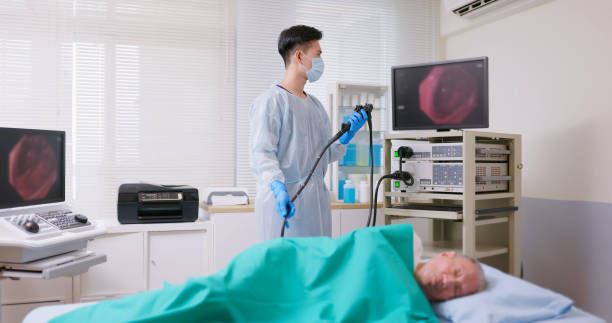
Colonoscopy: A thorough visual examination of the colon to detect and remove polyps.
Biopsy: Removal of tissue samples for microscopic analysis to confirm malignancy.
CT Scan and MRI: Imaging techniques to determine the cancer’s size and spread.
PET (positron emission tomography) CT: A highly sensitive imaging technique that helps detect cancer spread and assess treatment response.
Blood Tests: Includes checking for tumor markers like carcinoembryonic antigen (CEA).
Stool Tests: Detect hidden blood or abnormal DNA markers in stool samples.
Treatment Options for Colon Cancer
Treatment depends on the cancer’s stage and the patient’s overall health:
Surgery
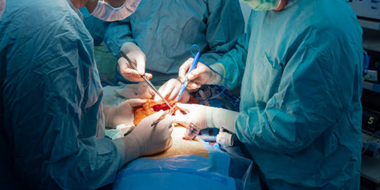
The most common option, surgery involves removing the cancerous sections of the colon to prevent further spread. It can be curative for early-stage cancers and is often combined with other treatments for advanced stages.
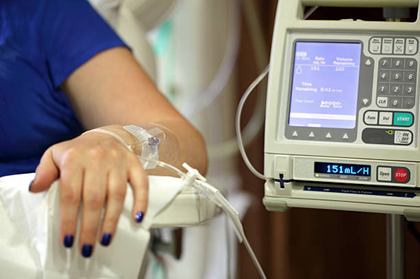
This treatment uses powerful drugs to destroy cancer cells or prevent their growth. It’s especially effective for shrinking tumors before surgery or managing cancer spreading to other parts of the body.
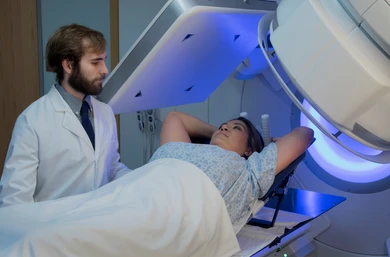
Radiation targets localized tumors precisely to destroy cancer cells while sparing healthy tissue. It is often paired with surgery or chemotherapy to maximize its effectiveness.
Dr. Manish Kumar, an accomplished colon cancer specialist in Bangalore, explains: “Radiation therapy is not commonly used as the primary treatment for colon cancer, but it can be used in specific situations, often as a palliative measure to manage symptoms like pain or blockage caused by advanced colon cancer, or to target remaining cancer cells after surgery if there is a high risk of recurrence. So, it is often used palliatively, but can be used with curative intent in certain circumstances depending on the stage and location of the cancer.”
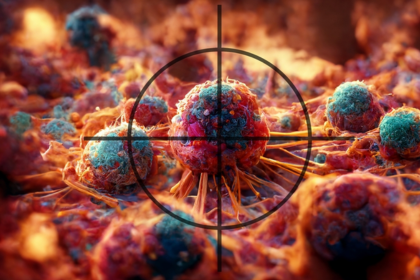
This advanced treatment focuses on specific genes or proteins driving cancer growth. By disrupting these pathways, targeted therapy halts the progression of tumors with minimal damage to normal cells.
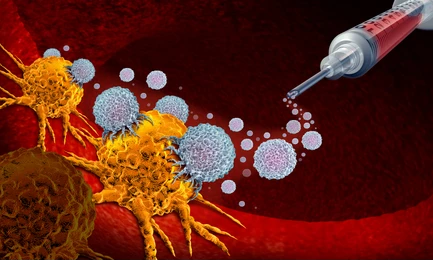
Immunotherapy enhances the body’s immune system, helping it identify and attack cancer cells more effectively. It offers promising results for patients with certain types of colon and rectal cancer.
Palliative Care

For advanced-stage patients, palliative care focuses on managing symptoms and improving quality of life. This holistic approach addresses physical, emotional, and psychological needs.
Why Choose Dr. Manish Kumar for Colon Cancer Treatment in Bangalore?
Dr. Manish Kumar, a renowned cancer specialist in Bangalore, offers:
Comprehensive expertise in treating malignant colon cancer and rectal cancer.
Compassionate, patient-focused care to ease the cancer journey.
Curious about survival rates and lifestyle tips for managing colon cancer? Here’s what you need to know.
Success Stories and Testimonials
“After persistent symptoms like unexplained fatigue and changes in bowel habits, I was diagnosed with stage II colon cancer. The initial diagnosis left me overwhelmed and terrified. However, Dr. Kumar and his team provided unwavering support and crafted a clear treatment plan tailored to my needs. His expert and precise treatment and after-care was exceptional, offering reassurance during every phase of my journey. Today, I’m cancer-free, enjoying a vibrant, active life, and forever grateful for his unwavering support.”
“Stage III colon cancer turned my life upside down, bringing fear and uncertainty. I was skeptical about the road ahead, but Dr. Kumar’s personalized care made all the difference. He addressed every concern, offering empathy and professionalism at every step. The chemotherapy sessions, though tough, were manageable due to his guidance. Now, being in remission, I feel hopeful and grateful to have regained control of my life.”
“My rectal cancer diagnosis was devastating, and I feared the worst. Dr. Kumar’s attention to detail during every phase of treatment, from the initial consultations to recovery, was unmatched. His constant encouragement and tailored approach made a significant difference. Today, I feel healthier and stronger than ever, and I owe my recovery to his dedication and expertise.”
Quick Bit
Globally, the five-year survival rate for early-stage colon cancer is around 90%. However, survival rates decrease as cancer progresses, underscoring the importance of early detection.
Dr. Manish Kumar, a prominent colon cancer specialist in Bangalore, shares,
“Patients can improve their prognosis and quality of life by altering certain lifestyle habits. Weight management, regular physical activity, and a diet rich in fruits and vegetables play a crucial role. Avoid red and processed meats, smoking, and alcohol as they increase colon cancer risk.”

